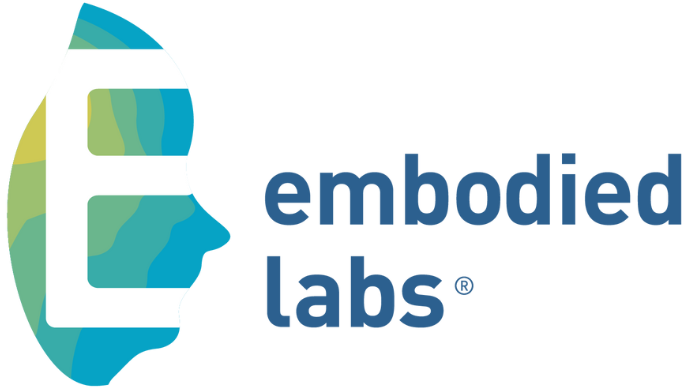Rush University Medical Students Used Embodied Labs as Immersion into Dementia Through BioPsychoSocial Storytelling
LOS ANGELES, October 25, 2019 - Recent research from Rush University shows how new technology is changing the way the healthcare and aging care workforce are being trained by using the virtual reality (VR) immersive training platform developed by Embodied Labs. Rush University medical student-researcher, Emily Phelps, spoke at several recent national medical conferences to share the results of her study highlighting how embodying a person living with Alzheimer's disease can positively change behavior resulting in enhanced person-centered care.
Phelps spoke at the American Medical Association (AMA) ChangeMedEd®, the 2019 Medical Women International Conference in New York City, and the 2019 Women in Medicine conference in Chicago, presenting her research on medical students who used the Beatriz Lab, an Alzheimer’s learning experience developed by Embodied Labs. In her study, Phelps had students complete the 20-minute training using a VR headset with 360-degree medical illustrations of changes in the brain structure and activity coupled with an immersive experience where the student virtually becomes a Latina woman on her 10-year journey with progressive neurodegenerative Alzheimer’s disease.
The study findings showed students increased knowledge of the disease with greater awareness of symptomatic variability to include impact on speech, perception, and activities of daily living (ADLs), became more empathetic for the perspective of older adults with dementia and more aware of their potential ageism bias; and gained insights and deepened appreciation into the family dynamic of dementia care realizing the family’s role in clinical accommodations and impact to their own health and wellness needs.
“I believe the VR technology combined with Embodied Labs’ approach of using immersive storytelling and medical illustration is powerful in training healthcare professionals,” said Phelps. “Taking a virtual journey inside the brain such as the ‘neuron forest’ showing how tau tangles and beta amyloid plaque develop to cause Alzheimer’s in the Beatriz Lab offers medical students, and other healthcare professionals, an opportunity to reinstate person-centered care into their learning experience.”
Her mentor and faculty co-investigator for the study was Neelum T. Aggarwal, MD, an associate professor of neurological sciences, senior examining neurologist at the Rush Alzheimer’s Disease Center, and Research Director of the Rush Heart Center who helped develop the Beatriz Lab by advising Embodied Labs on the vignette content and how to visualize the neuropathology that is seen in the brain of a person with Alzheimer’s.
“Over my career, I have had my patients, their family members, and their close friends, ask me ‘How does a person with Alzheimer’s feel when they experience memory gaps?,’ ‘ What is like to go through the day, when you have memory changes,’ and ‘What do plaques and tangles look like….where are they in a living brain?,’” said Dr. Aggarwal.
“Dr. Aggarwal has been a tremendous resource for us to ensure the scientific integrity of our Beatriz Lab meets the academic rigor needed to train medical students and other healthcare professionals,” said Carrie Shaw, CEO and co-founder of Embodied Labs. “Our mission is to engage the nation’s top medical and gerontology experts in our product development and it is this dedication that sets Embodied Labs apart from other VR training programs. Healthcare education is enhanced by combining biology, psychology and sociology into powerful storytelling. Every patient or client has a story and that is how we have approached our learning framework.”
Training Professionals and Families to Face the Alzheimer’s Epidemic
According to the Alzheimer’s Association, the disease currently affects 5.8 million Americans and more than 16 million of their family caregivers. With an expected increase to 14 million people developing Alzheimer’s by 2050, it becomes one of the biggest health challenges for healthcare professionals and families over the next 30 years. Today, the U.S. government’s healthcare and long-term care costs for Alzheimer’s is at $290 billion – one of the most costliest health conditions – and is set to skyrocket past $1 trillion in the next 30 years.
George Vrandenberg, chairman of the advocacy organization, UsAgainstAlzheimer’s, announced an effort to accelerate the person-focused care needs of those with Alzheimer's disease and their family caregivers and to engage the healthcare system in readiness to support this growing epidemic. In a recent Forbes article, Vradenberg shared, “The disease trajectory of Alzheimer’s is forcing our hand and we cannot afford to spend 10 years having the healthcare system catch up once new drug therapies and other disease solutions are established.” He added, “The healthcare system needs to start preparing now to more effectively detect, diagnose, address, and support Alzheimer’s patients and families today and over the next few decades.”
As the leader in VR healthcare and aging services training, Embodied Labs is dedicated to harnessing the power of new VR technology and providing a learning platform where physicians, medical and nursing students, senior living direct care workers, home care workers and other long-term care providers as well as family caregivers, can enter the world of the person with the disease and develop knowledge and empathy that enhance person-centered care to forever change how care is delivered.
Embodied Labs’ award-winning Beatriz Lab is the company’s premier product changing the way healthcare professionals and families learn about Alzheimer’s. It is being used by leading senior care organizations, such as the Green House Project, to train staff and educate families about the disease.
About Embodied Labs
Embodied Labs, headquartered in Los Angeles, is the leading immersive VR training platform for home care, senior living, hospice, medical and nursing schools, hospitals and employers interested in training employees to better support the needs of the aging population. Working collaboratively with healthcare providers, medical experts, and Hollywood filmmakers, led Embodied Labs to win the AARP Innovation Labs Global Challenge, OpenIDEO Challenge, and the XR Education Prize Challenge funded by the Bill and Melinda Gates Foundation. Learn more: embodiedlabs.com


